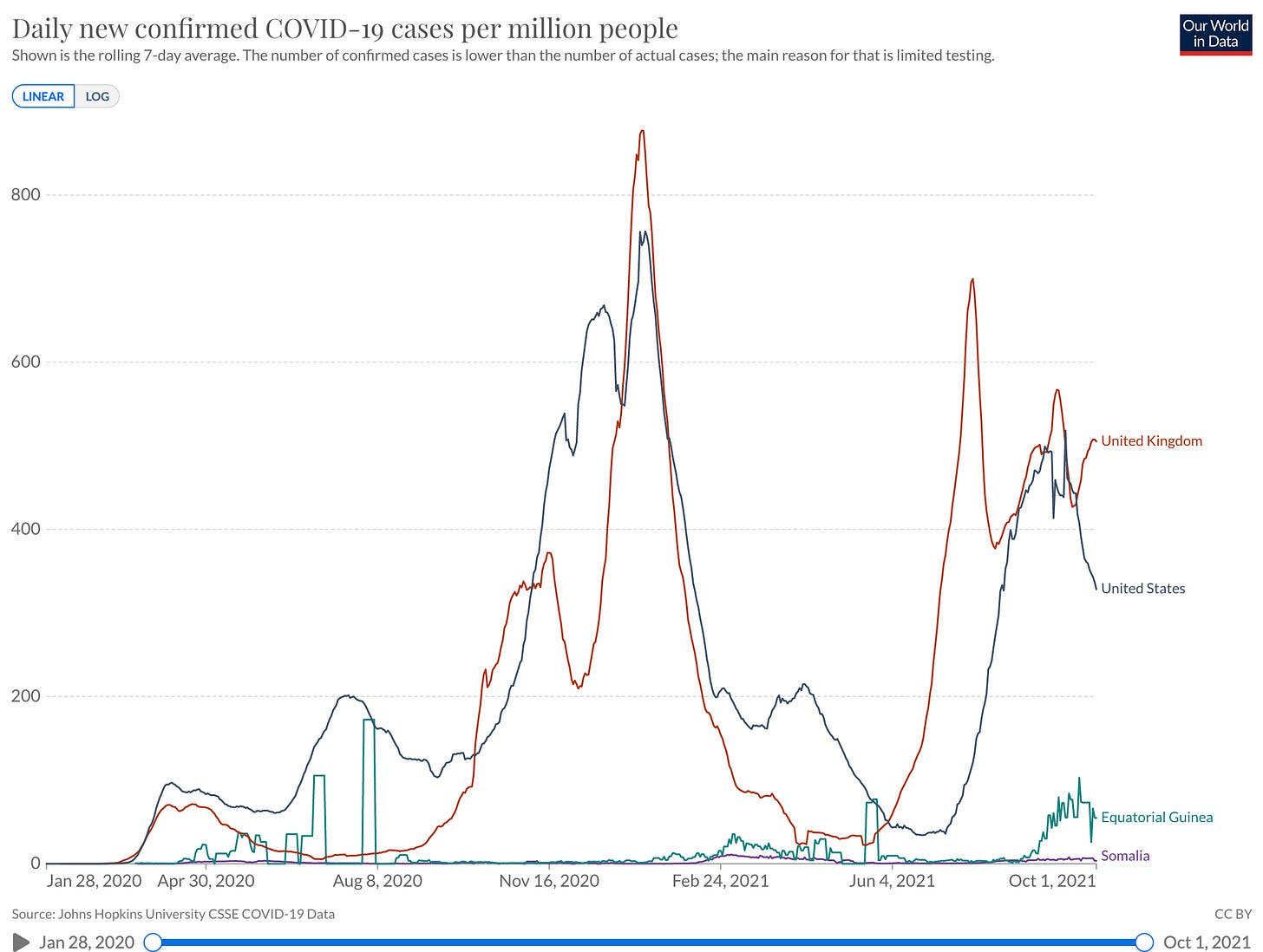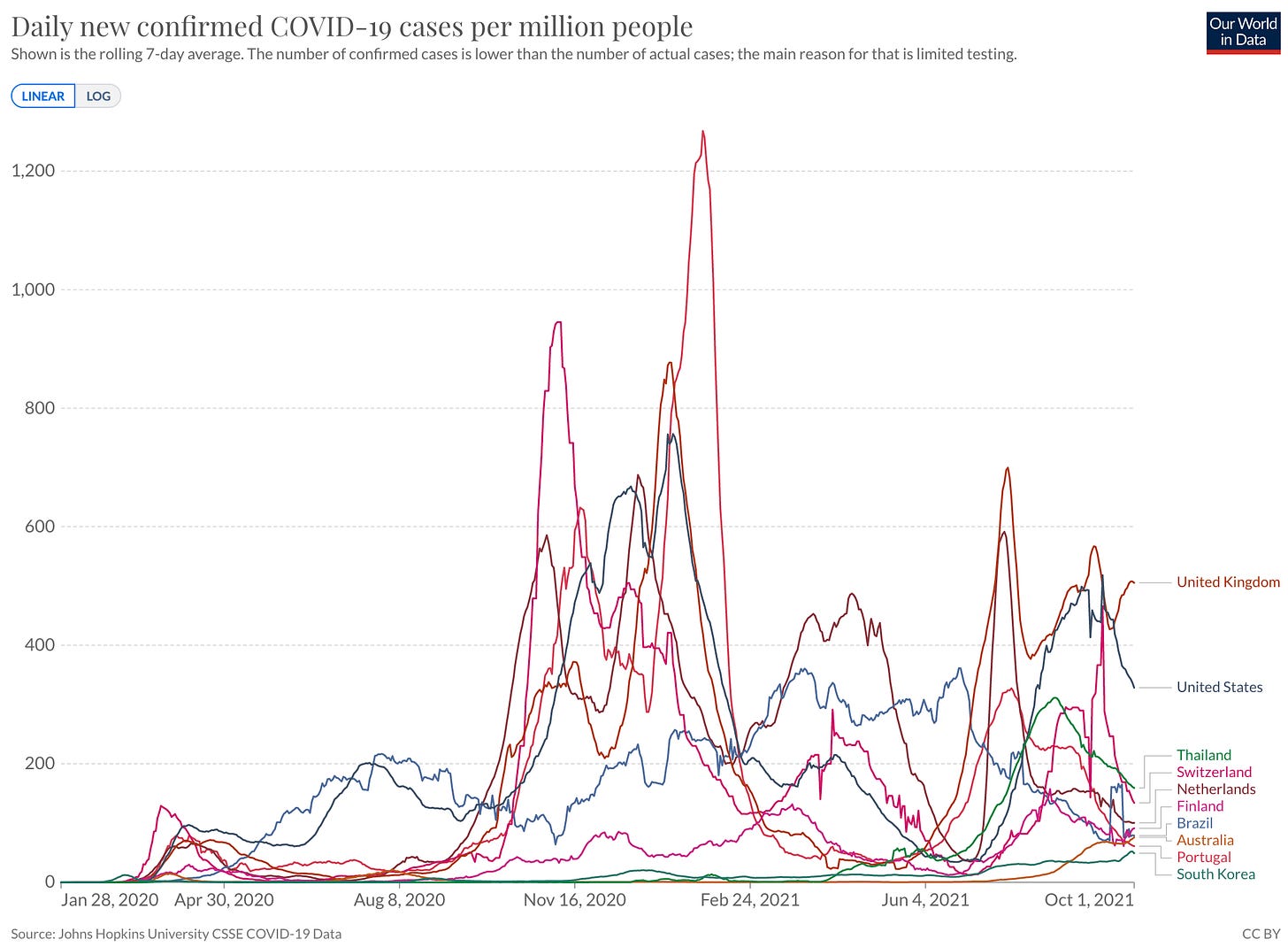In 2019, the US was ranked No.1 for pandemic preparedness
With the benefit of hindsight, perhaps we should take a look at that report
Welcome to Plugging the Gap (my email newsletter about Covid-19 and its economics). In case you don’t know me, I’m an economist and professor at the University of Toronto. I have written lots of books including, most recently, on Covid-19. You can follow me on Twitter (@joshgans) or subscribe to this email newsletter here. (I am also part of the CDL Rapid Screening Consortium. The views expressed here are my own and should not be taken as representing organisations I work for.)
I have been reading former FDA commissioner, Scott Gottlieb’s book, Uncontrolled Spread, which details the US’s bad handling of the Covid-19 pandemic. It is a nice national level pairing with Michael Lewis’s The Premonition (that I reviewed a few months back). Well you’ll like these books if you thought just having to go through a pandemic wasn’t enough and you wanted to be convinced that it all could be avoidable but for failures at multiple levels. If not, carry on reading this newsletter which is comparatively heartwarming.
Gottlieb points his fingers in lots of directions but notably towards the CDC. Lewis was no fan of them either. In reality, the CDC had a major branding problem. Its role wasn’t, or it did seem to be, managing a fast-moving crisis. It is often tagged with the line — “more like an academic institution” — as if that’s a bad thing. Well, it is a bad thing if you want to have people in charge who are happy making judgment calls on the basis of information at hand and not falling into traps of expectations from where information happened to be good in the past. But it is a good thing if you want to set yourself up with the knowledge so you can be prepared to deal with a pandemic.
And on that score, prior to Covid-19, the US CDC had an incredible rap. It was seen worldwide as the exemplar of such institutions. Gottlieb points out that may have not been quite deserved given the Zika experience but regardless they were held in high esteem.
And that rubbed off. In 2019, you know the very same year the global pandemic was seeded, a team of experts completed a multi-year review of the pandemic readiness of 195 countries. The Global Health Security Index published its final report in October. The US was ranked Number One overall with a score of 85.3 beating the UK with 77.9. What do those numbers mean? Well, it is an index. 100 would mean fully prepared. So no one was that as The Washington Post pointed out. But down in 195th place was Equatorial Guinea with 16.2.
Now, you know where this is going so let’s just do it.
I’ve added in Somalia (the 194th ranked country) for good measure. Suffice it to say the GHS Index got it wrong. Extraordinarily wrong. Couldn’t have been much more wrong. But near as I can tell, at the time the report was released, there wasn’t some broad critique. There wasn’t even surprise at the US’s ranking. After all, it had the CDC.
The big issue is that there was undue weighting to the wealth of countries in driving pandemic response. As it turns out, you may not have shiny institutions when you aren’t wealthy but you actually have a ton of experience with infectious disease and this report had no way really of being able to take that into account. If you read Gottlieb and Lewis through that lens you can see a solid hypothesis forming.
But let’s focus in on more ‘like with like’ comparisons. The report took into account the potential to seed a disease as well as other factors. The one really of interest is how it evaluated the ability to respond to a global pandemic and mitigate it’s spread. For that, the ‘gold’ ranked countries were:
Let’s go to our chart.
Or maybe this is clearer …
I threw in Australia as it was next on the list but in the “orange group” of unprepared countries. The interesting outlier is South Korea which was ranked 10 points lower than the US on this score and 20 lower than the UK.
This stuff matters. The report was influential in causing countries to calibrate their own expectations when Covid-19 hit.
See what Trump is holding up there … the report we are discussing. That was on 27th February, 2020, the very time Gottlieb notes that everything about the US system was failing. He likes his charts but, in fairness, this was one from a credible review; the sort of review that was designed to be held up at times like that to communicate to a country that things were in hand.
So let’s look at the data. Here is the US on rapid response.
Here is the UK.
And here is South Korea.
It looks like the exercising response plans had do to whether you had conducted simulation exercises. I think the US actually did do that in late 2019 so the data was a little old. The other difference was on trade and travel restrictions which had something to do with the ability to restrict travel. South Korea was one of a handful of countries that did not score a perfect grade.
I have to say that it is hard to read this report and not believe that they had done a good job gathering relevant data. There is a ton of it with hundreds of dimensions being measured. It is the sort of thing that should have been predictive of pandemic response but as it turned out was not.
To be the most kind here, what went wrong is that they had no dependent variable to use in order to provide some weighting of the hundreds of measures they had. Yes, there is a broad correlation amongst measures — being richer seems to allow you to do a lot of things that people would regard as “good.” But the issue that we found is that those factors were way overweighted.
But here’s the good news. We know this now. This data was collected prior to the pandemic and now we have all manner of measures of pandemic handling etc. Those measures have their own issues — the big one being there was only one pandemic and lots of randomness — but it should be possible to actually take this data and fit it properly.
Moreover, maybe this exercise could be repeated within country too. If there was one other big error in this reporting exercise is that it treated countries as the relevant unit of analysis. Maybe that is appropriate for many. But it wasn’t appropriate to understand the US.













